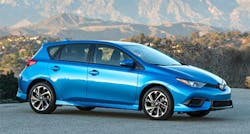Toyota to Keep Auris in UK in Show of Post-Brexit Confidence
Toyota Motor Corp. will retain a plant in Britain as the sole European producer of its Auris hatchback in a show of confidence in the U.K.’s future competitiveness as the country negotiates an exit from the European Union next year.
The world’s second-biggest auto manufacturer will make the third-generation Auris at its Burnaston factory near Derby in northern England, powered by engines from the Deeside facility in Wales, it said on Feb.28 .
The decision, which safeguards about 3,000 jobs, comes as a boost for the U.K. automotive industry as uncertainty over terms of the Brexit settlement causes manufacturers to review production plans. Around 85% of Toyota’s British output is exported, so “continued free and frictionless trade between the U.K. and Europe will be vital for future success,” Johan van Zyl, the company’s regional president, said in the statement.
The announcement on the Auris isn’t a surprise after the company said last year it would spend 240 million pounds (US$333 million) on updating equipment and technology in Burnaston. However, it doesn’t completely remove question marks over the automotive giant’s longer-term commitment to Britain.
‘Pragmatic’ Decision
“I think it’s a pragmatic decision,” said Ian Henry, director of automotive consultancy AutoAnalysis. “We don’t know how Brexit is going to pan out. If we get tariff-free trade, they’ll probably find a way of muddling through.”
The Burnaston plant was established in 1989 as Toyota’s first major bridgehead in Europe and was also a pioneer of hybrid-vehicle manufacturing.
U.K. Business Secretary Greg Clark said continued production of the Auris had been secured with the help of more than 20 million pounds in state funding toward the installation of Toyota’s new global production platform and signals that Britain can remain a major player in the sector.
Tariffs and other hurdles to trade could be disastrous for the U.K. industry since parts routinely move across borders several times during the manufacturing process.
PSA Group’s Vauxhall Motors is fighting to retain production of the Astra hatchback, while Jaguar Land Rover, owned by India’s Tata Motors Ltd., will slow production in the second quarter amid uncertainty over Brexit and a slump in demand for diesel vehicles in the wake of the Volkswagen AG emissions scandal.
By Christopher Jasper and Suzi Ring
About the Author
Bloomberg
Licensed content from Bloomberg, copyright 2016.
